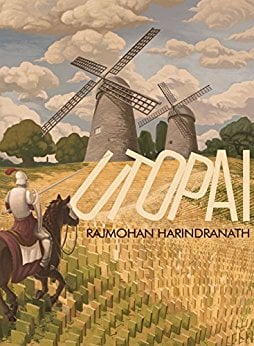Dissatisfied with the “utopian” society ushered in by a sentient AI, Don Alonso and Sancho begin a search for meaning and fulfillment through philosophical debate. However, beginning with its title — destined to be auto-corrected — UTOPAI falls short of these lofty ambitions. The titular society’s name is just the start of the novel’s flagrant borrowing from the iconic and influential works it situates itself among, more through association and assertion than any earned comparison, including Utopia, Nineteen Eighty-four, Brave New World, and the works of Ayn Rand and Kurt Vonnegut, among others. The heavy Don Quixote influence from character names to the novel’s cover is particularly perplexing.
The novel’s predictions and examinations of a sentient AI’s impact on all facets of society are thoughtful and convincing, though this becomes less so as the novel moves away from concrete speculation to more abstract musings. The look at how perfect data and endless abundance would upend economic systems predicated on scarcity and therefore society are particularly poignant. But the novel’s structure is tedious consisting entirely of exposition through characters explaining and pontificating.
While there is an attempt at characterization and world-building at the beginning, often through characters explaining the nature of the world they all live in to each other, these efforts and established details are largely abandoned beyond the first couple chapters, further disconnecting the novel’s sections. UTOPAI struggles to clearly define the society of its setting, then bombards the reader with counter-options, alternate possibilities, and rebuttals explaining how these other ideologies would fail, often boiling down to “but the AI…”. Indistinguishable characters come and go with little effect on the proceedings. Overall, the logic of its plot and characters is paper-thin and merely a vessel for these lectures.
UTOPAI’s description proclaims a radical new idea — “the domino theory” — but it struggles to clearly, or more importantly engagingly, explain this supposed core concept. It emerges in the middle of the novel explained as a model to understand anything and everything then disappears, seldom referenced again. UTOPAI simply isn’t a novel, or perhaps shouldn’t be trying to be one. The sections aren’t meaningfully connected resulting in a series of parallel digressions without clear or satisfying progression, development, or resolution. A better organized essay or treatise supported by research rather than speculation would have better served the subject matter and the reader.
~Andrew Davison for IndieReader

